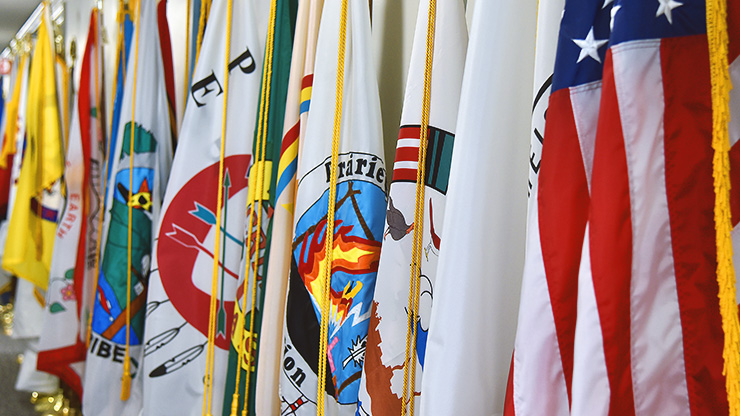
- Details
- By Levi Rickert
Opinion. Federal funding for tribal nations faced a disruption this week after the White House Office of Management and Budget (OMB) ordered all federal agencies to temporarily suspend grant, loan, and financial assistance programs. The Jan. 28 directive mandated that all federal financial aid disbursements cease by 5 p.m. the next day.
This decision had significant implications for tribal communities across Indian Country, where federal funding supports essential programs in health, housing, economic development, and more. A halt in these funds threatened to disrupt vital services for tribal communities that rely on them.
On Tuesday morning, I woke up in Hollywood, Fla., where I was attending the Seminole Tribe of Florida Renewable Energy & Sustainability Conference. The event hosted around 200 attendees, including tribal leaders deeply concerned about the potential funding freeze.
Iowa Tribe of Oklahoma Tribal Secretary Christie Modlin missed the morning session, occupied with urgent calls to fellow tribal council members about the looming financial shutdown. Other tribal leaders shared similar concerns, holding emergency meetings to strategize their response to the crisis.
Just before the 5 p.m. deadline, a federal judge blocked the White House directive. The OMB rescinded its memo the next day. Even with that news, tribal concerns about the potential for defunding did not go away.
In response, Muscogee (Creek) Nation Principal Chief David Hill issued a tribal executive order implementing "an immediate spending and hiring freeze for all of the executive branch - Tribally and federally funded employees." The Muscogee executive order excludes departments within the tribe's Department of Health.
"The EO is in response to President Trump's temporary freeze on federal grants and loans. As of today, Jan. 29, the freeze on federal funds has been rescinded. At this time (it) is still in effect until further notice," Hill said in a statement.
The White House later clarified that the OMB directive was meant to cut "unnecessary spending — such as DEI, the Green New Scam, and funding nongovernmental organizations that undermine the national interest," according to a press release.
The DEI acronym stands for diversity, equity and inclusion. The playbook of the second Trump administration, Project 2025, contains explicit anti-DEI language. For federal government employees in many departments and agencies, Project 2025 recommends that support of DEI policies should be grounds for termination.
Since Donald Trump returned to the White House, a series of executive orders, numerous internal memorandums, and other directives have railed against DEI.
American Indians and Alaska Natives hold a distinct place in their dealings with the federal government. This administration should disregard its war on DEI when it comes to the descendants of this country's Indigenous population.
John EchoHawk (Pawnee), the executive director of the Native American Rights Fund (NARF), wrote that the United States has a unique government-to-government obligation to Tribal Nations. "Because of this unique relationship, The United States must fulfill its trust obligation to protect Tribal treaty rights, lands, assets, and resources. Withholding federal funding without consultation is a step in the wrong direction."
Last Thursday, the day after a tragic air accident that left 64 American Airlines passengers and three Army helicopter crew members dead, President Trump blamed the accident—without evidence—on DEI.
This claim was made as recovery crews were still removing the dead from the frigid waters of the Potomac River. Such rhetoric dishonors the families of the dead and all thoughtful Americans.
It is clearly wrong to blame DEI for all of the ills of the United States.
Thayék gde nwéndëmen - We are all related.
More Stories Like This
The SAVE America Act Threatens Native Voting Rights — We Must Fight BackThe Presidential Election of 1789
Cherokee Nation: Telling the Full Story During Black History Month
Jesse Jackson Changed Politics for the Better
Native News Online at 15: Humble Beginnings, Unwavering Mission
Help us defend tribal sovereignty.
At Native News Online, our mission is rooted in telling the stories that strengthen sovereignty and uplift Indigenous voices — not just at year’s end, but every single day.
Because of your generosity last year, we were able to keep our reporters on the ground in tribal communities, at national gatherings and in the halls of Congress — covering the issues that matter most to Indian Country: sovereignty, culture, education, health and economic opportunity.
That support sustained us through a tough year in 2025. Now, as we look to the year ahead, we need your help right now to ensure warrior journalism remains strong — reporting that defends tribal sovereignty, amplifies Native truth, and holds power accountable.
 The stakes couldn't be higher. Your support keeps Native voices heard, Native stories told and Native sovereignty defended.
The stakes couldn't be higher. Your support keeps Native voices heard, Native stories told and Native sovereignty defended.
Stand with Warrior Journalism today.
Levi Rickert (Potawatomi), Editor & Publisher


